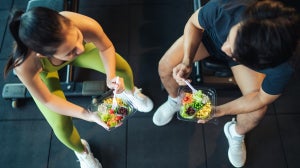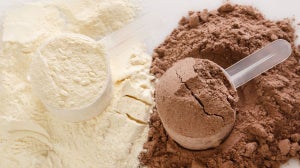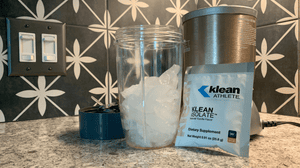
Created by Karlyn Grimes, MS, RD, LDN, CSSD+
When training sessions or competition are successfully completed, the real work begins. Refueling and rehydrating should be the top priority so the body can favorably adapt to training demands, prepare for future sessions and progressively improve. Ultimately, optimal post-exercise nutrition will largely depend on the type of exercise, and the intensity, duration and frequency of the exercise bouts.2 This portion of the Klean Nutrient Timing series will focus mainly on repletion during the two hour post-exercise ‘anabolic window’ while the final part of the series will address daily nutrient timing strategies that will further support physiological training adaptations and performance yield.‡
The Motivation
Let’s face it, all athletes experience training days where their “get up and go” has gone up and went. These days can affect physical, mental and emotional health, and if they occur frequently can contribute to overtraining syndrome and put personal bests out of reach. Most would agree that this is not the most motivating scenario, but fortunately athletes can keep their training fresh, invigorating and effective by investing in their recovery. Proper refueling and hydrating can moderate fatigue, promote muscle comfort, proper immune function, adequate sleep, positive mood, and minimize overall performance decay.
The Details
After intense training and competition, recovery must start immediately. Fueling should begin within 30 minutes post-exercise and continue aggressively up until the 2-hour mark. During this timeframe, muscle blood flow is cranking, and channels funneling glucose and amino acids into muscles are wide open. With every minute that passes, these channels begin closing and blood flow to recently worked muscles slows. If athletes wait too long, they will experience suboptimal glycogen repletion and compromised muscle protein synthesis (MPS). This effect is particularly noticeable when there is less than 8 hours between training sessions.
It is now clear that high-quality, rapidly-absorbed whey protein is the most convenient and effective post-exercise protein source to maximally stimulate muscle protein synthesis (MPS).3‡
Overall, a combo of carbs and proteins after training will lead to a decrease in catabolic hormones such as cortisol and catecholamines while increasing substrate availability and anabolic hormones such as growth hormone and insulin levels, allowing glycogen synthesis and MPS to head into overdrive.2‡
Fluids and electrolytes post-exercise will comprehensively complete the recovery picture.‡
The Post-Exercise Plan
Carbohydrates and Protein
It has been suggested that an optimal restoration of muscle glycogen post-exercise can occur through CHO intakes of 1.0–1.5 g/kg/h initiated within the first 2 hours after the cessation of exercise.1‡
Calculation Connection: 160 lb athlete ÷ 2.2 = 73 kg x 1-1.5 g/kg = 73-110 grams of carbohydrates
As soon after exercise as possible, aim for a ratio of 4 grams of carbohydrates to 1 gram of protein. For most, this will translate to 50-100 grams of carbohydrates and 15-25 grams of protein within 2 hours of exercise.
Calculation Connection (based on the carb calculations above): 73-110 grams of carbohydrates ÷ 4 = 18-28 grams of carbohydrates
Klean Recovery Milk Chocolate is a chocolate-flavored powder that can be blended with a variety of liquids to create a delicious shake. It contains carbohydrates such as dextrose and fructose that are rapidly absorbed, plus whey protein that is essential for muscle building and promotion of a positive nitrogen balance.‡
If you have less than 8 hours between training sessions, use a more nutrient-dense liquid, such as lowfat milk or milk alternative, to mix with Klean Recovery Milk Chocolate to ensure you receive 1.0-1.5 grams of carbohydrates and 0.3 grams of protein per kilogram of body weight per hour. Water is the perfect mixer when you have more time between training sessions or competition since expedited repletion is not as imperative.
Another option to increase protein intake, mix up a scoop of Klean Isolate with ~12 ounces of milk or a non-dairy alternative to provide the body with proteins.
A Special Note for Masters Athletes: Due to the slower recovery rates and possible impairment of muscle remodeling mechanisms as athletes age, recent research supports additional protein consumption after training, competition and throughout the day for Masters athletes.3
Fats
Avoid fats for 1-2 hours after training or competition so glycogen repletion and muscle protein synthesis is maximized as fat will delay gastric emptying and nutrient absorption.
Fluids and Electrolytes
Athletes should strive to consume 2-3 cups (16-24 oz) of fluid per pound of body weight lost, ideally with foods containing sodium to maintain normal sodium levels in the blood and replenish the loss of water that occurs with consumption of water alone. Consuming one to two Klean Electrolyte capsules with fluids after exercise may help replenish electrolytes and retain hydration.‡
Klean Hydration will also replace lost electrolytes while offering the added bonus of carbs to enhance fluid absorption and restock glycogen stores.‡
Simplified Version: Athletes should aspire for urine that appears clear or slightly yellow.
Additionally, athletes should consume a variety of foods, including colorful fruits and veggies, to increase their intake of other important electrolytes, antioxidants and phytochemicals.

The Peri-Exercise Benefits Are Endless
After investigating the benefits of nutrient timing in the peri-exercise period, it is clear that this is truly a window of opportunity for athletes to better meet their daily energy and micronutrient requirements. At the end of the day, if athletes do not use the peri-workout period to increase their nutrient intake, it will be almost impossible for them to meet their daily fueling and performance goals. Therefore, it makes logical sense for an athlete to focus on fueling to support their training regimen and maximize their athletic potential.
Bio Karlyn Grimes, MS, RD, LDN, CSSD, is the founder of Simply Simple Health (SSH) and author of “The Everything Anti-Inflammation Diet Book.” SSH creates and administers nutrition, fitness and health education programs for athletes, educators, coaches and sports teams at schools and colleges throughout the Boston area. Its programming includes individual and group sports nutrition counseling, as well as sport-specific personal training. SSH also contributes to numerous academic textbooks and magazines.
Karlyn has a dual Master’s degree in nutrition and exercise physiology from Boston University and a Bachelor of Arts degree in biology from Colgate University, with a minor in economics. She is a registered dietitian (RD) with the Academy of Nutrition and Dietetics, a certified specialist in Sports Dietetics (CSSD) and a licensed dietitian nutritionist (LDN) in the state of Massachusetts. She is currently a faculty member in the Nutrition and Biology Departments at Simmons College in Boston, where she teaches sports nutrition, medical nutrition therapy, exercise physiology, anatomy and physiology, general biology, and numerous other courses.
References
Alghannam, A.F.; Gonzalez, J.T.; Betts, J.A. (2018). Restoration of muscle glycogen and functional capacity: Role of post-exercise carbohydrate and protein co-ingestion. Nutrients, 10(2), 253.
Arent, S.M., Cintineo, H.P., McFadden, B.A., Chandler, A.J., & Arent, M.A. (2020). Nutrient Timing: A Garage Door of Opportunity? Nutrients, 12(1948), 1948.
Cintineo, H.P., Arent, M.A., Antonio, J. & Arent, S.M. (2018). Effects of protein supplementation on performance and recovery in resistance and endurance training. Frontier Nutrition 5(83).
If you currently have a professional, wholesale or affiliate athlete account, click here to place your order.

Related Articles
